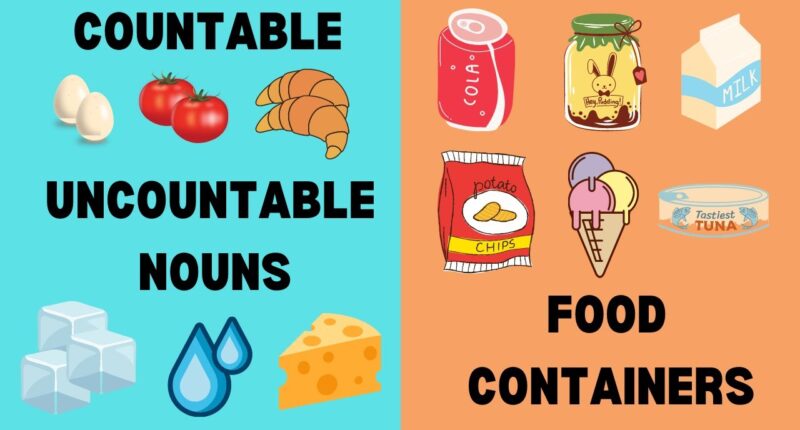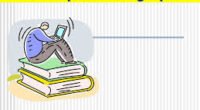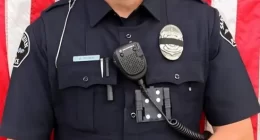Examples of countable and uncountable nouns – In the English language, there are countable and uncountable nouns. Countable nouns are those that can be counted, such as “one chair,” “two cats,” or “three books.” Uncountable nouns, on the other hand, cannot be counted and usually refer to things that are mass nouns or abstract concepts, such as “air,” “rice,” or “love.” While it may seem simple enough to understand the difference between countable and uncountable nouns, there are always exceptions to the rule. In this blog post, we will explore some examples of countable and uncountable nouns to help you better understand when to use each one.
Table of Contents
Countable Nouns
Countable nouns are those that can be counted and usually have a singular and plural form. For example, “cat,” “dog,” “person,” and “table.” Uncountable nouns, on the other hand, cannot be counted and usually don’t have a plural form. Examples of uncountable nouns include “water,” “air,” “sand,” and “music.”
Uncountable Nouns
One of the most difficult things about learning English is understanding when to use “a” or “an,” and when to use “some” or “any.” This is because there are countable nouns and uncountable nouns. In order to understand when to use each word, you need to first understand the difference between countable and uncountable nouns.
Countable nouns are those that can be counted. For example, you can count “dogs,” so “dog” is a countable noun. Uncountable nouns cannot be counted. For example, you cannot count “air” because it is impossible to say how many units of air there are.
When deciding whether a noun is countable or not, it is often helpful to think about whether or not you could put the word in the plural form. If you can, then it is probably a countable noun. So, for example, since you can say “dogs,” dog is a countable noun. On the other hand, if you cannot put the word in the plural form—if doing so would not make sense—then it is probably an uncountable noun. So, since you cannot say *airs*, air is an uncountable noun.
There are some exceptions to this rule of thumb, however. Some words that cannot be made plural can still be counted. For example, you can say “two pieces of equipment” even though you cannot say *equipments*. Similarly, words that can be pluralized can sometimes not be counted. For example, the word “information” is a countable noun when it refers to a single piece of information (e.g., “I have some information for you”). However, it is an uncountable noun when it refers to all information in general (e.g., “Too much information is a bad thing”).
If you are unsure whether or not a word should be considered countable or uncountable, look it up in a dictionary. Usually the entry will tell you if the word should be considered countable or uncountable and will give examples of how to use it correctly in sentences.
Note that there are some words that can be either countable or uncountable depending on how they are used in a sentence. These words are called “mass nouns” because they refer to a large quantity of something that cannot easily be divided into separate units. For example, the word “sand” is usually considered an uncountable noun because sand refers to a large quantity of tiny particles that cannot be easily divided into separate units. However, sand can also be used to refer to a single grain of sand, in which case it would be considered a countable noun.
Keep in mind that there are some words that can be either countable or uncountable depending on the context in which they are used. For example, the word “information” is considered an uncountable noun when it refers to all information in general. However, it is considered a countable noun when it refers to a specific piece of information (e.g., “I have some information for you”).
The following table provides some examples of countable and uncountable nouns:
Countable Nouns Uncountable Nouns dog air cat water person furniture child information student music woman advice man luggage
Some other examples of countable and uncountable nouns include:
Countable Nouns Uncountable Nouns book knowledge table money window advice chair information suitcase wisdom
One of the most difficult things about learning English is understanding when to use “a” or “an,” and when to use “some” or “any.” This is because there are countable nouns and uncountable nouns. In order to understand when to use each word, you need to first understand the difference between countable and uncountable nouns.
More Examples of Countable and Uncountable Nouns
There are many more examples of countable and uncountable nouns. Here are some more examples of countable and uncountable nouns:
Countable:
-One apple, two apples, three apples, etc.
-One person, two people, three people, etc.
Uncountable:
-Water
-Air
-Luggage
When to Use a Countable or Uncountable Noun
When it comes to using countable or uncountable nouns, there are no hard and fast rules. However, there are some general guidelines that can help you determine when to use each type of noun.
Countable nouns are typically used for things that can be counted or measured. For example, you might use a countable noun to refer to a specific number of items, such as “five books,” or to refer to something that can be quantified, such as “a lot of work.”
Uncountable nouns, on the other hand, are typically used for things that cannot be easily counted or measured. For example, you might use an uncountable noun to refer to a substance like “water” or “sand,” or to an abstract concept like “love” or “success.”
One way to remember the difference is that countable nouns usually have a singular and plural form (e.g., book/books), while uncountable nouns do not (e.g., water/waters).
Of course, there are always exceptions to the rule. Some countable nouns can be used in an uncountable way (e.g., information), and some uncountable nouns can be used in a countable way (e.g., hair). As with most grammar rules, the best way to determine whether a particular word should be treated as countable or uncountable is to consult a dictionary.
100 Examples of Countable Nouns
This countable nouns list is just to give you a basic sense of what kinds of nouns there are, and which ones are countable. It is in no way exhaustive. So, these 100 examples of countable nouns should be used as a basic reference guide.
- apple/apples
- orange/oranges
- cat/cats
- dog/dogs
- house/houses
- kitchen/kitchens
- table/tables
- book/books
- pen/pens
- pencil/pencils
- elephant/elephants
- carrot/carrots
- onion/onions
- garden/gardens
- noun/nouns
- verb/verbs
- chair/chairs
- train/trains
- bus/busses
- bike/bikes
- store/stores
- candy/candies
- bag/bags
- shirt/shirts
- sock/socks
- flower/flowers
- seed/seeds
- lake/lakes
- ocean/oceans
- animal/animals
- whale/whales
- fish/fish
- stream/streams
- cloud/clouds
- plant/plants
- cup/cups
- fork/forks
- spoon/spoons
- plate/plates
- straw/straws
- box/boxes
- bird/birds
- egg/eggs
- steak/steaks
- couch/couches
- light/lights
- door/doors
- room/rooms
- painting/paintings
- candle/candles
- apartment/apartments
- building/buildings
- purse/purses
- mirror/mirrors
- toilet/toilettes
- toothbrush/toothbrushes
- shower/showers
- towel/towels
- pool/pools
- lawn/lawns
- yard/yards
- ball/balls
- game/games
- kettle/kettles
- hoses /hoses
- phone/phones
- app/apps
- dollar/dollars
- cent/cents
- pound/pounds
- kilometer/kilometers
- mile/miles
- liter/liters
- hour/hours
- second/seconds
- month/months
- week/weeks
- day/days
- weekend/weekends
- holiday/holidays
- job/jobs
- salary/salaries
- tax/taxes
- scooter/scooters
- road/roads
- dream/dreams
- idea/ideas
- invention/inventions
- class/classes
- grade/grades
- brother/brothers
- sister/sisters
- aunt/aunts
- uncle/uncles
- cousin/cousins
- grandmother/grandmothers
- grandfather/grandfathers
- mother/mothers
- father/fathers
- child/children
100 Examples of Uncountable Nouns
These 100 examples of uncountable nouns can help give you a sense of what nouns are generally considered uncountable. Some of these nouns can be used as countable nouns occasionally, and in these instances, I have noted that beside the list item.
- Water
- Ice
- Bread
- Cereal
- Jam
- Cheese
- Honey
- Milk
- Tea
- Wine
- Beer
- Coffee
- Music
- Science
- Love
- Fear
- Anger
- Hope
- Peace
- Chaos
- Patience
- Art
- Electricity
- Money
- Propane
- Gas
- Time
- News
- Patriotism
- Knowledge
- Faith
- Wisdom
- Youth (can be countable as well)
- Beauty
- Creativity
- Rice
- Salt
- Sugar
- Flour
- Grass
- Butter
- Pepper
- Work
- Recreation
- Travel
- Ice Cream
- Cake (can be countable as well)
- Soup
- Alcohol
- Yogurt
- Air
- Evidence
- Weather
- Soap
- Chicken (the food)
- Beef
- Pork
- Ham
- Bacon
- Seafood
- Fish (the food)
- Lamb (the food)
- Salad (can be countable as well)
- Toast
- Meat
- Pasta
- Traffic
- Ketchup
- Mustard
- Mayonaise
- Blood
- Homework
- Data
- Gold (can be countable as well)
- Silver (can be countable as well)
- Bronze (can be countable as well)
- Cash
- Advice
- Assistance
- Furniture
- Fur (can be countable as well)
- Rain
- Wind
- Tennis
- Golf
- Soccer
- Baseball (the game)
- Football (the game)
- Badminton
- Basketball (the game)
- Bocce
- Croquet
- Chess
- Checkers
- Soil
- Dirt
- Mud
- Hay
- Fun
- Help
Other types of nouns
Other types of nouns include proper nouns, collective nouns, and abstract nouns.
Proper nouns are the specific names of people, places, or things. For example Sarah, London, and Christmas. Proper nouns are always written with capital letters.
Collective nouns refer to groups of people or things. For example team, family, and audience.
Abstract nouns are ideas, feelings, or qualities that we cannot see or touch. For example love, happiness, and anger.
Conclusion
I hope this article on countable and uncountable nouns has helped to clear up any confusion you may have had. As a general rule of thumb, countable nouns are things that can be counted (one apple, two dogs, three cats, etc.), while uncountable nouns are things that cannot be counted (water, sand, air). Of course, there are always exceptions to the rule, but if you remember this simple guideline then you’ll be able to use countable and uncountable nouns correctly most of the time.










